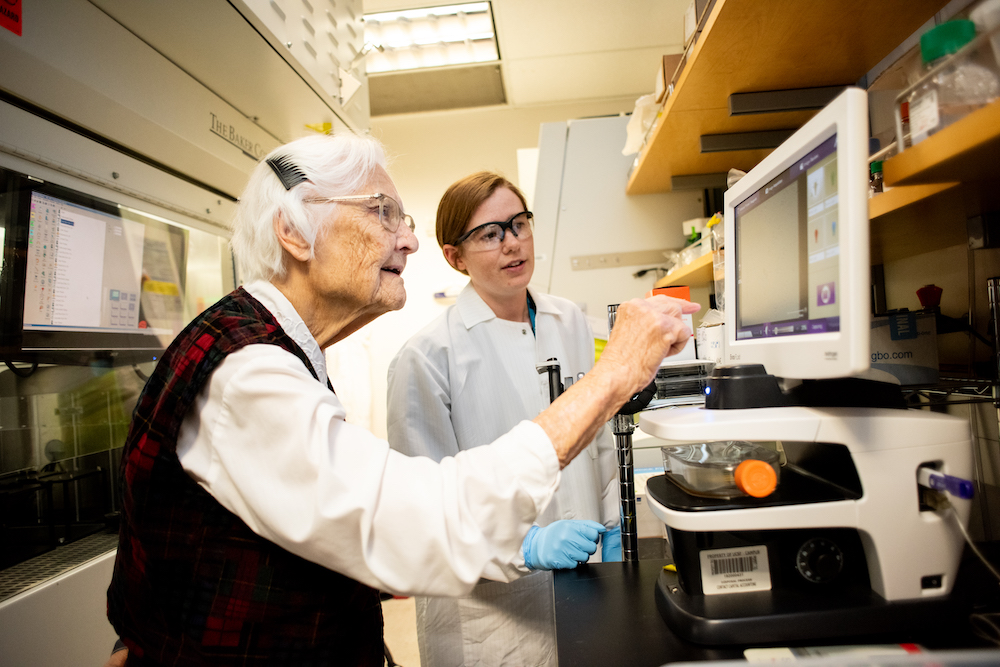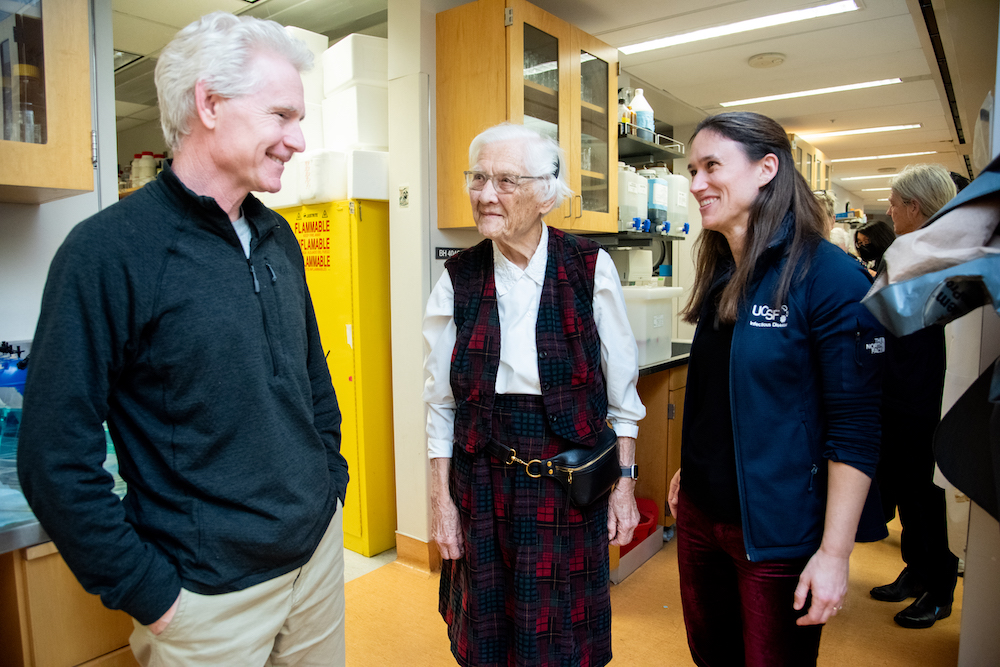The future is now: four insights from CZ Biohub Chicago’s inaugural scientific conference
Researchers gathered to discuss trends and technologies that will enable biological research
The UCSF lab of Joe DeRisi, CZ Biohub San Francisco president, has an active research program on the basic biology and clinical aspects of Balamuthia mandrillaris, an amoeba that causes a rare form of encephalitis with a current mortality rate greater than 90%. DeRisi and colleagues recently welcomed Thelma Dunnebacke, one of the world’s leading experts on pathogenic amoebae, to the lab for a lively scientific exchange.
At age 98, Dunnebacke – known to friends and colleagues as “Dunnie” – is officially retired from the California Department of Public Health, but she still goes into the Department’s Viral and Rickettsial Disease Laboratory in Berkeley almost every day to conduct research. It’s the oldest state public health lab in the U.S. devoted to virology, and Dunnebacke started working there in 1978, after 24 years as a research scientist at what was then known as the UC Berkeley Virus Laboratory.
Dunnebacke got the bug for science as an undergraduate student at Washington University in St. Louis. When one of her professors, Viktor Hamburger — a distinguished embryologist who did seminal work on the protein known as nerve growth factor, or NGF — offered her a job in his lab washing dishes, she immediately said yes. She went on to earn her Ph.D. at Washington University in 1954.
She eventually focused much of her research on a strain of Naegleria, a common soil amoeba, that was isolated from a eucalyptus grove in Berkeley. Later, when a new species of Naegleria was found in drinking troughs at a cattle ranch in southern California, it was named N. dunnebackei in a 2005 paper in recognition of her work in the field.
In 2015 she and DeRisi were among the co-authors of a paper in Annals of Neurology on using metagenomics to identify the presence of B. mandrillaris in brain tissue from human patients. This approach came to the fore in 2021 when a seriously ill patient with mysterious seizures showed up at a UCSF hospital. Working with DeRisi, Natasha Spottiswoode, an infectious disease physician at UCSF in charge of the patient’s case, used metagenomics to confirm the diagnosis as a rare case of infection by this brain-eating amoeba. And using a drug identified by the DeRisi lab in a 2018 study, Spottiswoode successfully treated the patient. (See coverage in Science magazine here.)
During Dunnebacke’s visit, Spottiswoode and Kaitlin Marquis of DeRisi’s lab brought her up to date on their research on B. mandrillaris, including new electron micrographs of the amoeba. In turn, Dunnebacke gave a presentation on her work with the organism.

“You can tell how much she loves research,” DeRisi marveled.
Spottiswoode notes that exchanges with public health scientists such as Dunnebacke and her colleagues at the California Department of Public Health are essential to improving treatment of rare infections.

“To decrease mortality from amoebic encephalitis, because it is so rare and so deadly, we really need a multidisciplinary approach that brings together public health experts, academic researchers, and clinician experts,” she says.
“Doctors and scientists haven’t known about brain-eating amoebas for very long — in fact, the discovery of amoebic encephalitis, and all the knowledge we’ve gained since then, all happened in the lifetime of Thelma Dunnebacke. She is a walking repository of amoebic expertise.”
Researchers gathered to discuss trends and technologies that will enable biological research
Learn More
CZ Biohub San Francisco Investigator analyzes health record data to find evidence that a shingles vaccine can lower the chances of developing dementia
Learn More
Learn more about the latest from the CZ Imaging Institute
Learn More
Stay up-to-date on the latest news, publications, competitions, and stories from CZ Biohub.
Cookies and JavaScript are required to access this form.